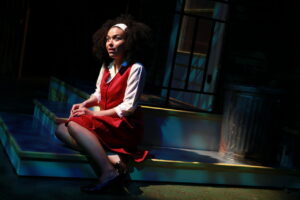Picking up what they began in New York, Clackamas Rep and star Lauren Steele take a stellar tale continental. Plus Forgotten Women, Chick Fight, Taylor Mac & more.
 Lauren Steele can’t say what it was about her that seems to have so impressed Cyndy Smith-English, managing director of Clackamas Repertory Theatre. After all, Steele was a young actor who hadn’t done much with the company, just a bit part and understudying for one play there. Even so, in 2019 Smith-English and her husband David, the Rep’s artistic director, cast Steele in a play called “Queens Girl in the World,” for which she was the sole performer, portraying a veritable community through the experiences and perspective of a young girl growing up in early 1960s New York.
Lauren Steele can’t say what it was about her that seems to have so impressed Cyndy Smith-English, managing director of Clackamas Repertory Theatre. After all, Steele was a young actor who hadn’t done much with the company, just a bit part and understudying for one play there. Even so, in 2019 Smith-English and her husband David, the Rep’s artistic director, cast Steele in a play called “Queens Girl in the World,” for which she was the sole performer, portraying a veritable community through the experiences and perspective of a young girl growing up in early 1960s New York.
“I don’t know what it is that they saw,” Steele says now, as she prepares to reprise the role of Jacqueline Marie Butler in a sequel, called “Queens Girl in Africa.” “I hadn’t really done much here. But I’d gone and got my degree and at school I got leads, which no one here was giving me. So, I wasn’t totally thrown to the wolves, but I also kept thinking, ‘You’re sure you want me doing this?’”
To say that Steele proved a revelation in the role would be incontrovertible – unless, like Smith-English, you’d already had a glimpse of Steele’s talent and charisma. I first encountered Steele (whose mother is the prominent Portland singer LaRhonda Steele) not long after she’d won the Portland region of the August Wilson Monologue Competition and competed against other high schoolers in the national finals in New York. At the time, in 2014, she was performing in the musical “Parade” for Staged!
“Lauren’s going to be one of those people who performs on Broadway as her day job, then writes and DJs and does a half-dozen other things on the side,” said Chanda Hall, artistic director of Staged!, in an article I wrote for “Artslandia.” Steele’s own term for her varied ambitions was, “I’m gonna pull a Maya Angelou.”
She’s working on it. She earned a theater degree (with a focus on playwriting) from Southern Methodist University in Dallas, and since returning home she’s recorded three singles and is finishing an album she hopes to release this summer.
And Clackamas Rep was so sold on Steele’s abilities, director Damaris Webb says, that they didn’t cast her in “Queens Girl” so much as find the play for her. “They were looking for a project specifically to feature Lauren.”
Steele’s return to the role, like nearly everything, was delayed by the Covid-19 pandemic. Clackamas Rep originally scheduled “Queens Girl in Africa,” the second play of a trilogy by Caleen Sinnette Jennings, to open last fall, until the surge of the Omicron virus variant led the company to postpone public performances.
Webb recalls that the production already was in technical rehearsals when the company decided on postponement. “I felt like we were in a great place – all the T’s were crossed, the I’s were dotted. We videoed the last run-through and then said, ‘Goodbye. Maybe we’ll see each other next year.’”
The eventual schedule wound up keeping both Webb and Steele busy: Webb will be directing Steele, among others, in the Western-themed musical “Bella: an American Tall Tale” at Portland Playhouse. Rehearsals for that production begin just a few days after Thursday’s opening of “Queens Girl.”
However dotted and crossed, Steele appreciated the extra time to absorb audiobooks and Nollywood films to help her inhabit the time and place, which in the second play is Nigeria from 1965 to 1967. In “Queens Girl in the World,” young Jackie has navigated the high expectations of her polished and professional parents, the emotional minefields of early adolescence and an eye-opening transition from her predominantly black neighborhood in the burrough to the white, liberal realm of a private school in Greenwich Village. The play starts in the awkwardly charming innocence of childhood, but as the times would have it, circumstances grow more serious, and the first installment’s denouement is the murder of Malcolm X: Jackie’s father, a friend of the slain leader, is so shaken that he decides to move his family back to the African motherland.
“Queens Girl in Africa” works just fine as a stand-alone play, but also as a seamless continuation of the story. “I was Queens Jackie,” she muses early on. “And Greenwich Village Jackie. Who will Africa Jackie be?” Once again, Jennings’ direct, detail-rich writing (“Raindrops look like diamond earrings on the flowers”) laces a compelling coming-of-age story with other powerful strains – the search for both individual identity and social belonging, the challenges of abutting cultures, the trickiness of political alignments, the unpredictability of historical tides.
The story’s themes resonate particularly with actor and director alike.
“Any black person who has grown up here has had to wrestle with multiple identities,” Steele says. “I know I have – growing up in a traditionally African-American neighborhood, then in a gentrified neighborhood, then going to a conservative, religious, mostly white college in Texas and finding solace in the arts.”
Webb’s life carries stronger echoes of young Jackie’s. “The play ends in Nigeria in 1967; I was born in ‘67 in Tanzania, where my parents were working for USAID (United States Agency for International Development),” she says. A few years later, Webb’s family would return to Africa. “I have memories of leaving the U.S. and going to Botswana and being in such a different place.
“I remember my father getting frustrated trying to grow a lawn in sub-Saharan Africa,” she laughs. “He kept trying all these different kinds of grass seed, but none of them worked…So I was much younger than Jackie is in the play, but I have lots of memories of governmental housing and multinational playmates and those sorts of experiences.”
“Queens Girl in the World” starts out cute and sweet but deepens as it goes. In …Africa the lines of tension are clearer earlier on. So do the artists consider it a darker play?
“It’s darker in terms of world circumstances,” Steele acknowledges. “Jackie even has a line near the end: ‘I’m leaving my parents in tribal-war-torn Nigeria to return to race-war-torn America.’ But I think it’s lighter in terms of her personal development. She ages two years within the show but I think her innocence remains, in that she’s optimistic and wants to think the best of everyone.”
“I don’t know if it’s darker but I would say it’s more mature,” adds Webb. “Yes, there’s violence and tanks in the street; but there’s also the joy of life and friendship and discovering yourself.”
Oregon ArtsWatch
Arts & Culture
MARCH 31, 2022 // DRAMAWATCH, THEATER // MARTY HUGHLEY
